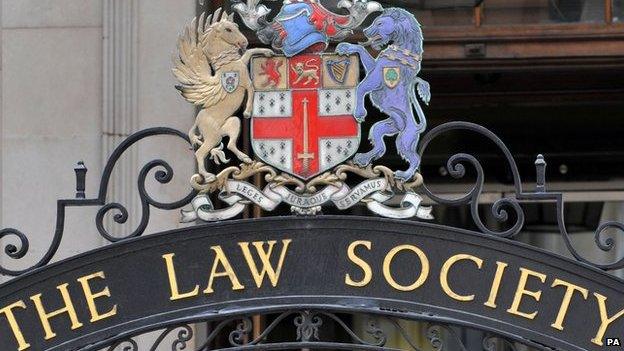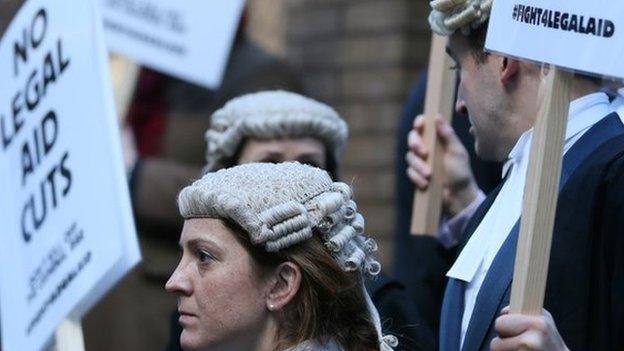Legal aid reforms: Solicitors lose appeal against cuts
- Published

Lawyers have lost a court appeal against government plans to cut by two thirds the number of duty solicitor contracts at magistrates' courts and police stations in England and Wales.
Solicitors' associations argued that cutting the number of contracts from 1,600 to 527 had "serious defects" and was a threat to access to justice.
But Court of Appeal judges dismissed an appeal that plans were legally flawed.
The Ministry of Justice says savings are needed in the legal aid system.
Appeal judges Lord Dyson, the Master of the Rolls, Lord Justice Elias and Lord Justice Sales upheld a High Court ruling in the government's favour made in February.
The result is a defeat for the Law Society - the body representing solicitors - which brought the appeal along with the Criminal Law Solicitors' Association and the London Criminal Courts Solicitors Association.
The Law Society argues that capping the number of duty solicitor contracts will bankrupt many small legal firms, and may jeopardise people's access to a lawyer.
'Vital issue'
Law Society president Andrew Caplen said: "We remain concerned that vulnerable people may not be able to obtain legal representation if they are accused of wrongdoing," he said.
"Without proper legal representation there may be miscarriages of justice. Criminal legal aid solicitors are critical for ensuring that anyone accused of a crime has a fair trial."
Jonathan Black, president of the London Criminal Courts Solicitors' Association said it was "vital" that legal aid became an election issue.
"We can't stress enough that additional cuts in an already-stretched system aren't necessary and we urge the public to demand a re-think.
As for our own legal position, we're taking stock and considering our next steps," he said.
The lawyers asked the court to continue an injunction which prevented the Lord Chancellor working on the bidding arrangements pending the outcome of their case.
They argued it should be continued to allow them to seek to make a final appeal to the Supreme Court, the highest court in the land, on Monday.
Final appeal
Rejecting the application, Lord Dyson said the Supreme Court might not be able to deal with the matter on Monday, adding: "We are not persuaded we should continue the injunction any longer."
The judge said: "There has been a very considerable slippage in the programme the Lord Chancellor set himself to bring about these very significant changes he wishes to bring about and we don't think it would be right to add to the period of delay."
The government announced its plans to cut the number of firms doing duty solicitor work in magistrates' courts and police stations in February last year.
Lord Chancellor and Justice Secretary Chris Grayling has faced vehement opposition to the plans from lawyers, including strikes and protests outside Parliament.
A Ministry of Justice spokesman said: "We welcome today's judgment and intend to continue with the tender for new criminal legal aid contracts on Friday.
"Our legal aid reforms are designed to ensure the system is fair for those who need it, the lawyers who provide services as part of it and importantly the taxpayers who ultimately pay for it.
"Anyone suspected of a crime will still have access to a legal aid lawyer of their choosing after reform, just as they do now."
- Published18 February 2015

- Published23 January 2015

- Published4 June 2013
